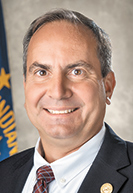Subscriber Benefit
As a subscriber you can listen to articles at work, in the car, or while you work out. Subscribe NowThe porn industry, which has battled age verification laws in several states, won a preliminary injunction Friday against a new Indiana statute that would require certain porn websites to prevent Hoosiers under 18 from accessing adult material.
Senate Enrolled Act 17, which was set to take effect July 1, could result in those websites asking for personal information such as a driver’s license number to verify a person’s age.
But U.S. District Judge Richard Young granted a preliminary injunction, ruling that the law is “likely unconstitutional” because its age verification requirements could infringe on the First Amendment rights of the adults seeking to access legal adult material.
Young’s order also noted that the law “does not sufficiently advance the government’s interests in protecting minors from harmful obscene speech because minors can easily circumvent the law using technology or searching for websites not covered by the Act.”
The case now awaits further legal proceedings.
Broader fight
Laws with a similar intent have been passed in Texas, North Carolina, Montana, Virginia, Arkansas, Utah, and Mississippi.
And, like in Indiana, many of them have been challenged in court by the Free Speech Coalition, a group that includes Pornhub and other porn websites as well as producers and distributors of adult material.
The Texas law remains in effect as the Supreme Court weighs the Free Speech Coalition’s full appeal. The Utah law was upheld by a federal judge in August, and a federal judge dismissed a challenge against Louisiana’s law in October.
Indiana Attorney General Todd Rokita posted on X, formerly Twitter, that his office looks forward to “upholding our constitutional duty” to defend Indiana’s new law in court.
“Children shouldn’t be able to easily access explicit material that can cause them harm. It’s common sense,” Rokita posted. “We need to protect and shield them from the psychological and emotional consequences associated with viewing porn.”
The new law also would allow parents or guardians of a child harmed by a violation of the age verification requirement to sue for monetary damages, injunctive relief and attorney fees.
The law also gives the Indiana attorney general the authority to investigate suspected violators of the law, seek an injunction against them and a civil penalty of up to $250,000.

The bill’s author Sen. Mike Bohacek, R-Michiana Shores, said the bill received good feedback and passed smoothly during the legislative session.
“I believe it’s constitutional. Otherwise, I wouldn’t have filed it,” Bohacek said.
He added that he believes it’s sad that the Indiana General Assembly had to take action for the adult entertainment industry to regulate who is viewing its content.
He compared it to the alcohol sales industry, which required identification to verify a consumer’s age before purchasing beverages.
“It’s not the way it works in any other industry, and it shouldn’t be any different,” Bohacek said.
He said the law was a step in the right direction to protecting children.
“That’s why you have three branches of government,” Bohacek said. “Now we just have to see if we’re going to pass constitutional muster.”
The Free Speech Coalition noted that it has repeatedly asserted that “we can and should work to prevent minors’ from accessing age-inappropriate material.”
But it said in written remarks that there are less burdensome solutions that the Indiana law that “do not violate the rights of legal adults to access the internet without enduring surveillance or risking their anonymity.”
Privacy concerns

Indiana University Maurer School of Law C. Ben Dutton Professor of Law Fred Cate said the U.S. Supreme Court established two decades ago that a law can impose burdens on speech in an effort to protect children, but that burden cannot block speech for adults.
“If it’s just indecency, pornography material harmful to minors, whatever you call it, adults get access to it, it’s protected by the First Amendment. And therefore, there are limits to what you can do in terms of trying to restrict that access in order to protect children,” Cate said.
He said when he served on a commission for the Federal Trade Commission on access and security about information online 25 years ago, they said there was no way to reliably verify a person’s identity and providing them access to information securely.
“I’m actually quite empathetic with the legislature wanting to do something to protect children from sexually explicit expression. And it’s astonishing how accessible that is online,” Cate said.
Cate recalled an incident where a student at Indiana University was arrested for making thousands of fake IDs in his dorm room.
“So is that really what we’re going to rely on for age verification,” Cate said.
He also pointed to the Driver’s Privacy Protection Act, which limits what a driver’s license information can be used for.
“It’s not that the goal isn’t a worthy one. It’s been worthy all along as case after case has gone to appellate courts and the Supreme Court. And as those courts have said, The burden is too great on First Amendment rights. And the burden is probably only getting bigger,” Cate said. “It’s not one of the things that technology has solved. Because the privacy risks and security risks are getting bigger because of technology.”
Alternatively, Cate mentioned how public libraries have filters on what can be searched blocking adult entertainment websites. He said that seems like more of a thoughtful step in the right direction that strikes a balance.
“But the biggest thing I’d say is we will never block access to sexually explicit material to kids. We didn’t do it 50 years ago when teenage boys were looking at their dad’s Playboy [magazines] in the garage. And we’re certainly not able to do it now,” Cate said.

Neal Eggeson, an attorney at Eggeson Privacy Law, said that alcohol sales websites just ensure a user is of legal age but that there’s no way to have age verification without identity verification.
“Age assurance has worked pretty well for all of us for the past, however many decades now, either verify on your own or maybe have some kind of third party provider verify your age,” Eggeson said.
He pointed to Meta which has its users verify their age by entering their birthdate.
Eggeson said one of the biggest concerns he has is the potential for data breaches for having to give adult websites personal information.
“If the largest and best resource corporations in the world cannot keep your personal information safe, why on earth would anyone think that the state of Indiana can do a better job? What you’re doing is you are creating a database where anyone’s sexual interest or proclivity is suddenly going to be accessible in a data breach,” Eggeson said.
Eggeson also noted the Child Online Protection Act that was passed in 1998 to restrict minor’s access to material that is deemed harmful to them.
“The fact that we are going down this road again on a state-by-state basis is frustrating to say the least,” Eggeson said. •
The Associated Press contributed to this story.
Please enable JavaScript to view this content.

